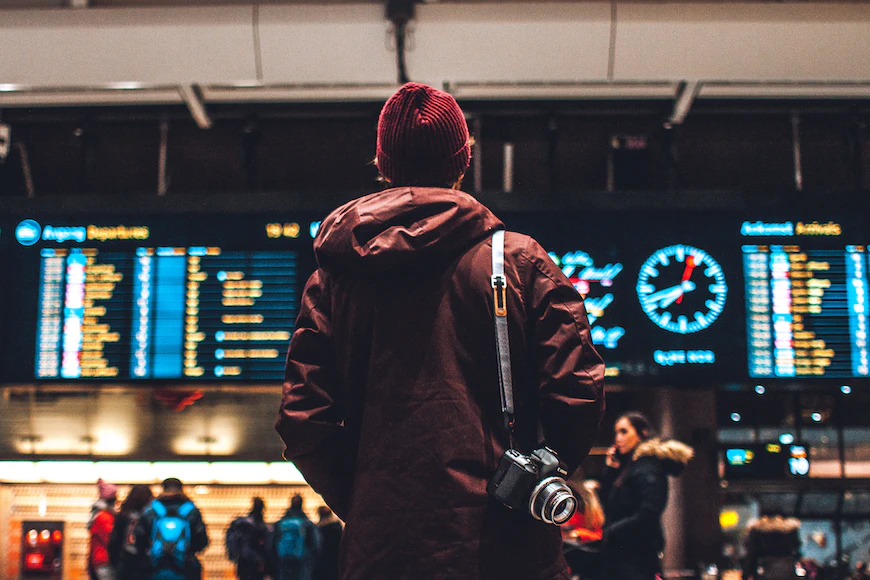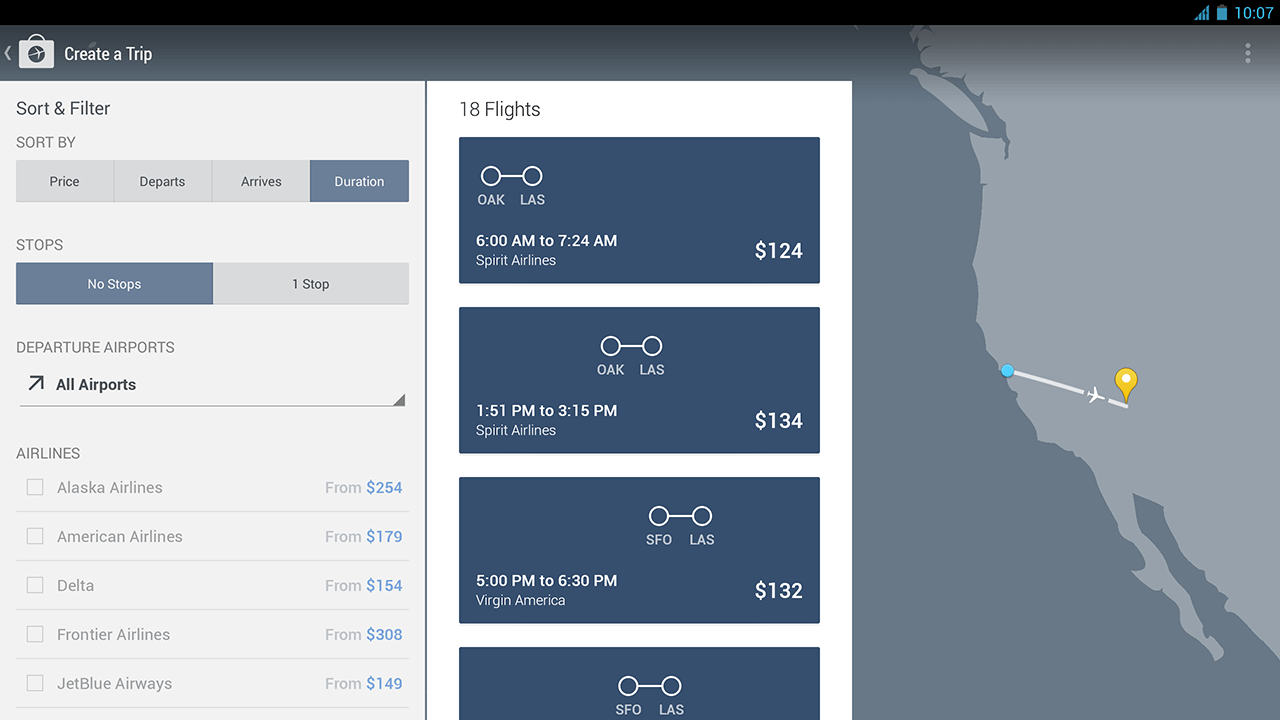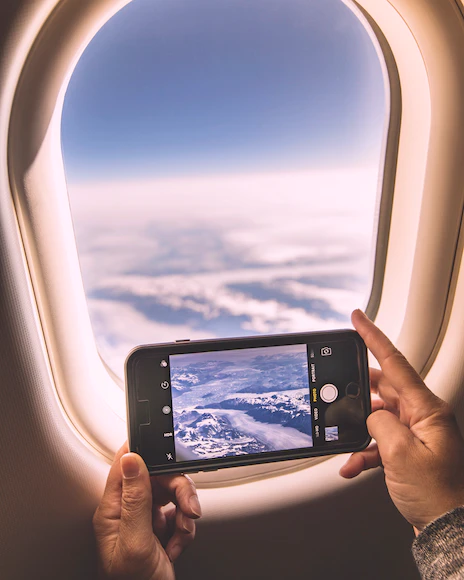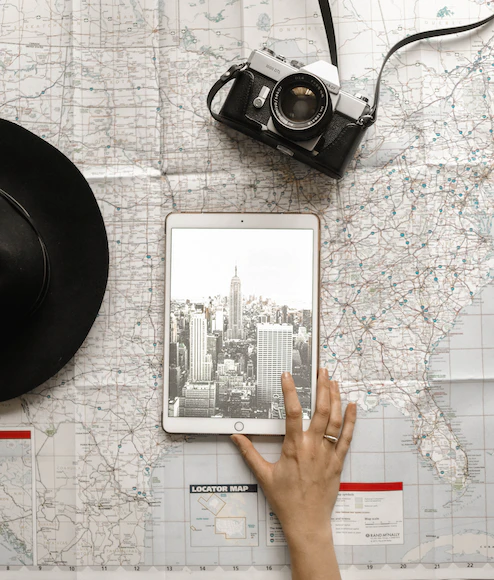Imagine living in a future of more convenient, secure, and immersive travel than ever. This vision is becoming a reality as technology develops, changing how we view the world. Technology is revolutionizing every facet of the travel experience, from the minute we daydream about a location to the thrilling encounters we have along the route.

Technology developments have recently changed the tourism business, bringing a new era of opportunities and experiences. Nowadays, we have access to much knowledge owing to internet travel platforms offering various alternatives for researching, planning, and booking vacations. Gone are the days when we just relied on travel agencies and guidebooks. How we plan and organize our travel has been completely transformed by websites and applications like Expedia, Booking.com, and Airbnb, which provide ease and personalized suggestions based on our tastes.

The smooth travel experience has also been improved by technology. We no longer have to struggle with paper paperwork or wait in huge lines at airports. With the widespread use of digital check-in and boarding permits, we can quickly pass through security by scanning our cell phones. Airports now use biometric technology, such as facial recognition, to speed up security checks and reduce wait times. In addition, we can confidently travel, knowing that our luggage is secure thanks to remote locking systems and GPS tracking.
Additionally, technology has created a brand-new universe of immersive experiences. We may explore virtual tours, participate in immersive cultural encounters, and navigate foreign places using interactive guides thanks to virtual reality (VR) and augmented reality (AR) technologies. Language barriers have been eliminated through translation and language-learning software, allowing us to interact with locals and fully experience other cultures.
But technology’s influence on travel goes beyond comfort and immersion; it also promotes sustainability and environmentally friendly behavior. For example, transportation is being revolutionized by electric and driverless cars, which provide greener options that cut carbon emissions. In addition, technology has made it easier for hotels to become environmentally friendly and for travelers to adopt sustainable tourism practices due to rising environmental awareness among travelers.

Technology has also changed how we look for and select vacation experiences. Social networking sites have transformed into windows into the globe, allowing us to find undiscovered gems, read reviews, and draw inspiration from other travelers. Travel influencers and user-generated material greatly influence our trip plans, introducing us to new experiences. Peer-to-peer travel services like Uber, Lyft, and Airbnb have allowed us to interact with locals, enjoy real experiences, and support local economies.
We shall examine how technology is transforming travel in the future in this post. We’ll look at how innovations in travel planning and booking, hassle-free travel encounters, immersive technology, environmentally friendly practices, and experiential travel are changing how we see the globe. So buckle up as we enter the thrilling world of technology-enabled travel, where the opportunities are endless, and the adventure waits.

Future of Travel: Advanced Planning and Booking
The development of online travel platforms has tremendously facilitated and improved travel planning and booking in the current digital era. Expedia, Booking.com, and Airbnb are just a few of the media that have revolutionized how we plan, research, and book our vacations by offering a variety of advantages that make the procedure more accessible and more effective.
The abundance of information and choices offered to travelers by Internet travel platforms is one of their main benefits. People may access various locations, lodgings, flights, and activities with just a few clicks, allowing them to research and evaluate possibilities without leaving the comfort of their homes. In addition, travelers can now access thorough descriptions, reviews, images, and even virtual tours of hotels and locations, helping them to make better selections. Gone are the days when travelers had to rely entirely on travel agencies or guidebooks for information.

Additionally, online travel agencies’ competitive pricing and offers make it simpler for tourists to choose reasonable solutions that fit their budgets. These platforms frequently give users access to special offers and packages that reduce the cost of travel, lodging, and entertainment. Furthermore, travelers are empowered to locate the most incredible bargains and book the most affordable vacation alternatives, thanks to the opportunity to compare rates across different suppliers.

Another essential benefit of technology-driven travel platforms is personalized advice. These systems analyze users’ interests, travel history, and browsing behaviors using artificial intelligence (AI) and machine learning algorithms to offer personalized suggestions. For example, by comprehending their interests, the platforms may recommend suitable locations, lodgings, and activities that suit travelers’ tastes. Furthermore, by offering customers carefully chosen alternatives that are more likely to satisfy their requirements and wants, this personalized approach helps travelers save time and effort.
A significant resource for travelers is incorporating user reviews and ratings on internet travel sites. People may make better judgments and obtain insights into the caliber and suitability of lodging, activities, and places by reading first-hand accounts and comments from other travelers. Travelers can make decisions with confidence based on the experiences of others thanks to this user-generated material, which promotes a sense of trust and authenticity.

It is impossible to overestimate the accessibility and convenience of online travel platforms. Travelers may save time and work by planning their entire vacation and booking it online. In addition, the platforms frequently offer intuitive search tools and user-friendly interfaces, enabling users to personalize their search parameters and filter results according to their unique choices, including location, price range, amenities, and more.

As a result of the growth of online booking platforms, the process of planning and arranging travel arrangements has been altered and is now quicker, easier, and more individualized. As technology develops, we may anticipate more improvements in planning and booking capabilities, ultimately revolutionizing how we travel.
Seamless Travel Experience:
Technology has completely changed the travel experience in today’s fast-paced world, making it easier and more convenient than ever. Technology improvements have completely changed how we travel, making the entire experience easier and more pleasurable from when passengers enter the airport until they arrive at their destination.
The use of digital check-in and boarding permits is one of the key developments in the seamless travel experience. The days of generating paperwork on paper or standing in a queue to check in are long gone. Instead, travelers can use the airline’s mobile app or website to complete the digital check-in procedure. They may electronically choose their seats, fill out the required information, and get their boarding permit.

This convenience saves time by eliminating the need for paper documentation and enables travelers to go straight to security checks, which eases airport traffic.
Biometric technology, notably facial recognition, is another breakthrough in revolutionizing the travel experience. To improve passenger convenience and expedite security procedures, airports worldwide install biometric technology. Travelers’ faces are scanned and compared to passport images using facial recognition technology, enabling quick and precise identification verification. This makes it unnecessary to review documents manually, streamlines the security screening procedure, and cuts down on lines, making airport operations quicker and more effective. In addition, by reducing wait times and enabling a smooth passage through airport checkpoints, biometric technology improves security and the whole passenger experience.
Another game-changer in providing a stress-free travel experience is smart baggage. Smart baggage has various functions, including GPS tracking and remote locking systems. Using GPS technology, travelers can follow their luggage in real-time, giving them peace of mind and lowering the possibility of misplaced or mistreated luggage. Additionally, smart baggage frequently has remote locking systems that can be operated by smartphone applications, making it simple for travelers to protect their bags. This function provides more security and convenience while guaranteeing that personal goods are protected during the trip.
Additionally, technology has aided in creating travel applications that compile all necessary travel data onto a single, centralized platform. These applications give users up-to-the-minute information on delays, gate changes, and airline itineraries.
Additionally, they provide services like mobile boarding passes, letting travelers view their boarding tickets from their cell phones. As a result, travelers can stay organized, lessen their likelihood of missing essential updates, and have a more pleasant trip by having all the necessary information in one location.

By doing away with the need for paper documentation, expediting security procedures, and offering creative luggage management and tracking solutions. Digital boarding cards and check-in, biometric security, and intelligent bags with GPS monitoring and remote locking systems are just a few instances of how technology has revolutionized how we travel without worry and traverse airports. More improvements that improve the seamless travel experience will come along as technology develops, making travel more accessible and fun.
Immersive Experiences: Future of Travel
In recent years, the emergence of immersive technologies like virtual reality (VR) and augmented reality (AR) has completely changed how we encounter places and cultures. These technological advancements have created a new realm of discovery, enabling travelers to transcend conventional travel restrictions and submerge themselves in enchanting virtual worlds. Additionally, by removing language obstacles and allowing engagement with locals, developments in translation and language applications have further boosted cultural immersion. Let’s investigate how these technologies alter how we travel and experience the globe.
By providing virtual tours and immersive experiences, VR and AR technologies have changed how people travel. Travelers may take themselves to famous monuments, historical locations, and breathtaking natural landscapes without being there. With the help of 360-degree pictures and virtual tours, users of VR headsets may explore places and attractions in a completely immersive way. Through this technology, people may get a true sense of a location, getting a helpful preview and assisting in travel planning decision-making.

Contrarily, AR improves the real-world experience by adding digital components on top of it. Travelers can use smartphone applications that support augmented reality to aim their devices toward landmarks, important locations, or other items to get dynamic graphics and real-time information. With virtual guides guiding users through the streets and providing historical data and fascinating tales, augmented reality city guides offer a fun and educational approach to experiencing a place. By bringing history to life and enhancing tourists’ awareness of other cultures, these technologies make touring an engaging and informative experience concerning future travel.
Travelers have always struggled with language obstacles, which prevent them from communicating and fully experiencing a culture. However, improvements in language learning software and translation have lessened this problem. These applications offer real-time spoken and written language translation using voice recognition and machine translation technology. Using cell phones, tourists can interact with locals, understand signs and menus, and explore foreign locations. Moreover, with their enormous language libraries, these applications can provide precise and relevant translations.

They make communication easier and allow visitors to engage with locals more deeply, promoting cross-cultural understanding and forging strong connections. Additionally, other features like language lessons, cultural advice, and pronunciation guidance are frequently included in language-learning apps. By being familiar with the local language and traditions, tourists can better negotiate social situations and fully immerse themselves in the local way of life. These technologies enable travelers to explore countries more confidently and participate in more genuine and meaningful experiences by crossing the language barrier.
Sustainable and Eco-Friendly Travel
As travelers grow more aware of the environment, sustainable and eco-friendly travel has increased in popularity in recent years. This movement has been greatly aided by future travel-based technology, making it possible for environmentally friendly modes of transportation to arise, along with green travel and lodging trends. So let’s look at how technology influences how we travel in the future.
Introducing electric and autonomous cars is one of the most critical developments in sustainable transportation. Due to their lack of emissions, electric vehicles (EVs) have become increasingly popular as a cleaner alternative to conventional fuel-powered vehicles. Travelers now have more options to use electric transportation throughout their trips, including hiring an electric car or using electric vehicle-sharing services, as EV charging infrastructure increases internationally.

Travelers may now quickly and easily locate and book ecologically friendly lodging thanks to the platforms and resources technology has made available for eco-certifications. These lodgings, which range from eco-lodges run on renewable energy to hotels with energy-efficient architecture and water conservation techniques, allow guests to reduce their carbon footprint without sacrificing quality or comfort.
Technology has also made sustainable tourist practices possible by raising people’s knowledge and comprehension of environmental problems. Travelers may get information about eco-friendly activities, sustainable tourism projects, and responsible travel rules through websites, apps, and social media platforms. In addition, travelers may choose the sights and activities they partake in with knowledge, favoring those that help local people, protect the environment, and advance cultural heritage.

Eco-tourism, in terms of future travel, which emphasizes preserving and maintaining natural ecosystems and biodiversity, has also grown due to technology. Eco-tourism businesses may advertise sustainable experiences and attract a larger audience through digital channels. The activities available to tourists include eco-friendly hiking and trekking excursions, wildlife conservation initiatives, and educational initiatives that promote environmental awareness. Using technology, tourists may engage with these encounters and help protect delicate ecosystems while learning more about and developing tremendous respect for nature.

The Rise of Experiential Travel: Future of Travel
The way we find and select travel experiences has certainly changed due to social media and influencers. Platforms like Instagram, Facebook, and YouTube have transformed into digital travel guides that let consumers discover places through eye-catching images and unique stories. Because their followers are inspired and influenced by the information they collect and the suggestions they provide, travel influencers are important in influencing travel decisions. In addition, travel decisions have been significantly impacted by the increase in user-generated content as more people rely on honest reviews, pictures, and videos posted by other travelers.
The sharing economy has also transformed how we interact with locals and access exceptional travel opportunities. Ridesharing services like Uber and Lyft have upended traditional transportation infrastructures, which provide practical and economical solutions.
On the other hand, Airbnb has completely changed the hotel industry by enabling visitors to stay in local residences and fully experience the local culture. Moreover, by allowing people to share their resources and abilities, these platforms for the sharing economy not only boost local economies but also provide financial advantages to tourists.

In conclusion, technology has changed how we travel by providing more sophisticated planning and booking choices, smooth travel interactions, immersive experiences, sustainable and eco-friendly alternatives, and access to authentic local experiences. As technology advances, there are even more exciting future travel prospects.

We can go on novel and fascinating journeys, broadening our horizons and enhancing our awareness of the varied world we live in, if we embrace these technological breakthroughs and fully use their potential. So let’s assume technology’s future travel revolutionary potential and explore explorations rich in human connection, learning, and meaningful experiences. Our travel experiences in the future are sure to be excellent. Stay tuned with the Web Capitals for more!


























Leave a Reply